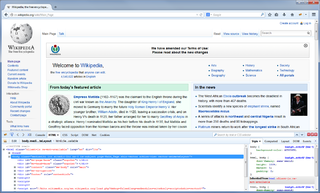Gecko is a browser engine developed by Mozilla. It is used in the Firefox browser, the Thunderbird email client, and many other projects.
XUL, which stands for XML User Interface Language, is a user interface markup language developed by Mozilla. XUL is an XML dialect for writing graphical user interfaces, enabling developers to write user interface elements in a manner similar to web pages.

Mozilla Firefox, or simply Firefox, is a free and open source web browser developed by the Mozilla Foundation and its subsidiary, the Mozilla Corporation. It uses the Gecko rendering engine to display web pages, which implements current and anticipated web standards. Firefox is available for Windows 10 and later versions of Windows, macOS, and Linux. Its unofficial ports are available for various Unix and Unix-like operating systems, including FreeBSD, OpenBSD, NetBSD, and other platforms. It is also available for Android and iOS. However, as with all other iOS web browsers, the iOS version uses the WebKit layout engine instead of Gecko due to platform requirements. An optimized version is also available on the Amazon Fire TV as one of the two main browsers available with Amazon's Silk Browser.

Mozilla Thunderbird is a free and open-source email client that also functions as a personal information manager with a calendar and contactbook, as well as an RSS feed reader, chat client (IRC/XMPP/Matrix), and news client. Operated by MZLA Technologies Corporation, a subsidiary of the Mozilla Foundation, Thunderbird is an independent, community-driven project that is managed and overseen by the Thunderbird Council, which is elected by the Thunderbird community. As a cross-platform application, Thunderbird is available for Windows, macOS, FreeBSD, Android, and Linux. The project strategy was originally modeled after that of Mozilla's Firefox, and Thunderbird is an interface built on top of that Web browser.

Conkeror is a Mozilla-based web browser designed to be navigated primarily by a computer keyboard. Its design is mainly patterned after the text editor GNU Emacs, with some influence from other programs, including vi.
Netscape Plugin Application Programming Interface (NPAPI) is a deprecated application programming interface (API) for web browser plugins, initially developed for Netscape Navigator 2.0 in 1995 and subsequently adopted by other browsers.

The Mozilla Application Suite is a discontinued cross-platform integrated Internet suite. Its development was initiated by Netscape Communications Corporation, before their acquisition by AOL. It was based on the source code of Netscape Communicator. The development was spearheaded by the Mozilla Organization from 1998 to 2003, and by the Mozilla Foundation from 2003 to 2006.
NoScript is a free and open-source extension for Firefox- and Chromium-based web browsers, written and maintained by Giorgio Maone, a software developer and member of the Mozilla Security Group.

Tab Mix Plus was a Mozilla Firefox extension that adds to the tabbed browsing functions in Firefox. It was a popular extension on Mozilla Add-ons, which records download statistics. TMP is a collection of features from other extensions built in one package. Lifehacker named it one of their "Top 10 must-have Firefox extensions" for 2009. PC World said that "With Tab Mix Plus, Firefox tabs go past the obvious and into the indispensable... it's hard to imagine how you lived without it." As the only extension providing multi-row tab support, Wired and CNET both called it a "must-have" that is "powerful" and "gives you what feels like an infinite amount of control over tab behaviour."
In the context of the World Wide Web, a bookmark is a Uniform Resource Identifier (URI) that is stored for later retrieval in any of various storage formats. All modern web browsers include bookmark features. Bookmarks are called favorites or Internet shortcuts in Internet Explorer and Microsoft Edge, and by virtue of that browser's large market share, these terms have been synonymous with bookmark since the First Browser War. Bookmarks are normally accessed through a menu in the user's web browser, and folders are commonly used for organization. In addition to bookmarking methods within most browsers, many external applications offer bookmarks management.
A browser toolbar is a toolbar that resides within a browser's window. All major web browsers provide support to browser toolbar development as a way to extend the browser's GUI and functionality. Browser toolbars are considered to be a particular kind of browser extensions that present a toolbar. Browser toolbars are specific to each browser, which means that a toolbar working on a browser does not work on another one. All browser toolbars must be installed in the corresponding browser before they can be used and require updates when new versions are released.

Firebug is a discontinued free and open-source web browser extension for Mozilla Firefox that facilitated the live debugging, editing, and monitoring of any website's CSS, HTML, DOM, XHR, and JavaScript.

iMacros is a browser-based application for macro recording, editing and playback for web automation and testing. It is provided as a standalone application and extension for Mozilla Firefox, Google Chrome, and Internet Explorer web browsers. Developed by iOpus/Ipswitch, It adds record and replay functionality similar to that found in web testing and form filler software. The macros can be combined and controlled via JavaScript. Demo macros and JavaScript code examples are included with the software. Running strictly JavaScript-based macros was removed in later versions of iMacros browser extensions. However, users can use alternative browser like Pale Moon, based on older versions of Mozilla Firefox to use JavaScript files for web-based automated testing with Moon Tester Tool.

Mozilla Firefox 4 is a version of the Firefox web browser, released on March 22, 2011. The first beta was made available on July 6, 2010; Release Candidate 2 was released on March 18, 2011. It was codenamed Tumucumaque, and was Firefox's last large release cycle. The Mozilla team planned smaller and quicker releases following other browser vendors. The primary goals for this version included improvements in performance, standards support, and user interface.
Content Security Policy (CSP) is a computer security standard introduced to prevent cross-site scripting (XSS), clickjacking and other code injection attacks resulting from execution of malicious content in the trusted web page context. It is a Candidate Recommendation of the W3C working group on Web Application Security, widely supported by modern web browsers. CSP provides a standard method for website owners to declare approved origins of content that browsers should be allowed to load on that website—covered types are JavaScript, CSS, HTML frames, web workers, fonts, images, embeddable objects such as Java applets, ActiveX, audio and video files, and other HTML5 features.
Firefox was created by Dave Hyatt and Blake Ross as an experimental branch of the Mozilla browser, first released as Firefox 1.0 on November 9, 2004. Starting with version 5.0, a rapid release cycle was put into effect, resulting in a new major version release every six weeks. This was gradually accelerated further in late 2019, so that new major releases occur on four-week cycles starting in 2020.
Browser security is the application of Internet security to web browsers in order to protect networked data and computer systems from breaches of privacy or malware. Security exploits of browsers often use JavaScript, sometimes with cross-site scripting (XSS) with a secondary payload using Adobe Flash. Security exploits can also take advantage of vulnerabilities that are commonly exploited in all browsers.
Mozilla is a free software community founded in 1998 by members of Netscape. The Mozilla community uses, develops, publishes and supports Mozilla products, thereby promoting exclusively free software and open standards, with only minor exceptions. The community is supported institutionally by the non-profit Mozilla Foundation and its tax-paying subsidiary, the Mozilla Corporation.






